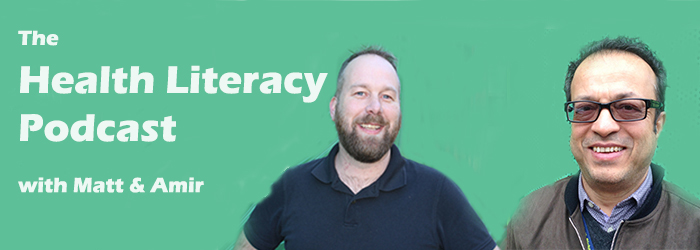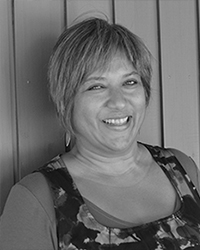Health Literacy Podcast: latest episodes

Talking about the many ways we can improve health information.
Episode 1: Dr Ruth DeSouza (click here)
(22 Minutes, 30 seconds)
Matt & Amir are joined by Ruth DeSouza a health researcher with a passion for health literacy.
She speaks about two new projects she has been working on, a new tool to improve health information and how technology that tracks your fitness is changing the way we think about health information.
Matt also talks about the upcoming ‘Drop the Jargon” day and Amir considers what health information will look like in the future. Please join us.
Music courtesy of Purple Planet

This week’s guest: Dr Ruth DeSouza
Ruth has worked as a nurse, therapist, educator and researcher. Ruth’s participatory research with communities is shaped by critical, feminist, and postcolonial approaches
Ruth contributes to migration and health-related activities through being a steering committee member of The Centre for Global Migrations Research Theme at Otago University, Dunedin, New Zealand; an associate of the Centre for Applied Cross-cultural Research Te Pae Rangahau Tauhōkai Ahurea and a member of the Migration Research Network, hosted by eSocSci Hui Rangahau Tahi.
She is also a member of: the Research Institute on Social Cohesion (Department of Premier and Cabinet, State Government of Victoria) and on the Scientific Committee of the 1st World Congress on Migration, Ethnicity, Race and Health – Diversity and Health, 17-19 May 2018 – Edinburgh, Scotland. She’s a member of the sub-working group on refugee women’s health within The Migrant and Refugee Women’s Health Initiative (a joint project by The Royal Australian and New Zealand College of Obstetricians and Gynaecologists and Migration Council Australia) and a reference group member of the Victorian Transcultural Mental Health Education and Service Development Consultancy at St Vincent’s Hospital Melbourne.
Related Information
Connecting with communities using Health Literacy principles
Plain language is essential for effective communication. When health information is presented in plain language, it is easier for people to understand. This is particularly important when dealing with diverse communities where English may not be the first language for many residents.
The Arthur Kleinman Explanatory Model
This model was first proposed by Arthur Kleinman, who developed a set of eight questions to ask a client to learn more about their explanatory model to provide better patient-centered care.
Working with interpreters: troubleshooting and trust-building
Building relationships with clients can be a delicate task. Trust is integral to effectively carrying out our work professionally, but what happens when we bring an interpreter into the scenario? Find out in this article.
A Skilled Way of Checking In
During workshops, we find that questions like “Does that make sense?” often fall short of revealing the true picture. ‘Teach-back’ is a simple yet powerful tool which allows for far better communication. Read this month’s blog to know more about this tool.

Let us inform you about our EVENTS & NEWS?
